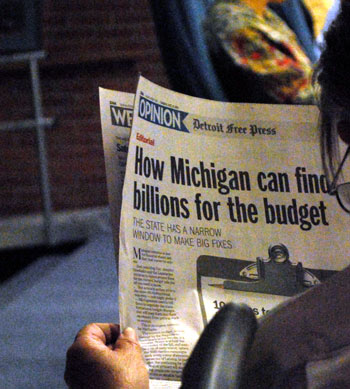
While state Rep. Rebekah Warren (D-District 53) addressed the Ann Arbor city council, laying out the budget situation in Lansing, a meeting attendee read the Detroit Free Press editorial: "How Michigan can find billions for the budget." (Photo by the writer.)
Ann Arbor City Council meeting (Oct. 5, 2009): State Rep. Rebekah Warren (D-District 53) addressed the city council at the start of the meeting, bringing the council up to date on the state budget that had passed, but which she’d voted against. Over the next year, there will be $1.16 million less in revenue sharing paid to the city of Ann Arbor, starting with an October check that will be around $200,000 less than last year. This outcome is on the optimistic end of the projected range provided to the city council several weeks ago by Tom Crawford, the city’s chief financial officer.
Before the public hearing began on the proposed new building design guidelines for downtown, Mayor John Hieftje indicated his and other councilmembers’ strong preference for a set of guidelines that were integrated into a required process as a part of a project review. So the several members of the public who spoke on the issue knew there was support on council for their view.
And University of Michigan student life was a part of the meeting in several ways – seen and unseen. The seen part included students who spoke against recent increased ordinance enforcement activity in the Hoover Street area on homecoming weekend. They announced a protest march.
The unseen part included an item stricken from the agenda that would have allowed the city to generate revenue from parking cars in Frisinger Park on home football Saturdays. And it included a closed session on a lawsuit stemming from the tasering of a UM student by Ann Arbor police in 2005. The incident arose out of the student’s arrest for having an open container of alcohol. A recent opinion from the U.S. District Court (Eastern Division) on a motion from the city for summary judgment found that the police officer was entitled to qualified immunity on the first application of the taser, but not on the second. [Full Story]





